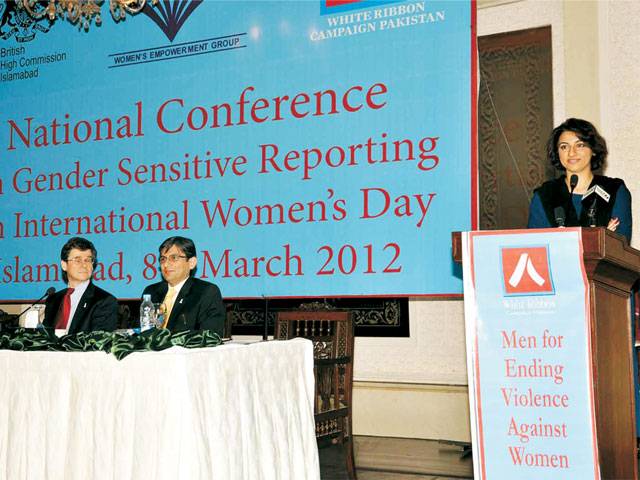ISLAMABAD - Managing Editor TheNation, Rameeza Majid Nizami, has said that communication can be one of the most powerful tools in the fight to end violence against women.
Rameeza Majid Nizami said this while addressing National Conference on the Gender Sensitive Reporting on Thursday. Women Empowerment Group (WEG) on the platform of the White Ribbon Campaign, Pakistan (WRCP) hosted the conference. The code of ethics for the gender sensitive reporting were also introduced.
Rameeza Nizami said that conference initiative was the first ever in the country, anticipating the need for the code of ethics for gender sensitive reporting. She said many forms of violence against women are so deeply imbedded in our socio-cultural-tribal structure that they are taken for granted. Starting from the low social status of women in Pakistan to the problems that arise due to general poverty in the country, to the gender biased distribution of powers and resources in the family and society, there are countless acts of violence where women are treated as commodities and not human beings, she added.
British High Commissioner, Adam Thomson, shared on the occasion that malnutrition in Pakistan, especially in the female segment of society, has been increasing with each passing day as women are still deprived of their fundamental rights. Pakistan also ranks at 132nd in global gender gap ranking of 135 countries while due to malnutrition, 320 women out of 100,000 lose their lives during pregnancy, he added.
The British High Commissioner said that malnutrition in Pakistan especially in the female segment of society is increasing with each passing day as women are still deprived of their fundamental rights like freedom of education, and freedom of expression.
Women constitute half of the population of Pakistan while there are just 25 percent women in labor force in Pakistan and they have been getting lesser salaries as compared to their male colleagues.
Ambassador of Sweden Lars-Hjalmar Wide, Gajus Schelpema, said that women in Pakistan are subjected to dependency and subordination due to their lower social, economic and political status in society.
To bring a social change it is indispensable that all key elements of the society cooperate with each other, share their expertise and experience and come up with creative ideas to cope with our social problems. It is a bitter reality that cases of violence against women appear so frequently on media that they no longer manage to grab attention of audiences or higher authorities unless they are sensationalized by the media.
Katrina Hussain, a journalist, said that people working in both print and electronic media become victims of wrath of various state and non-state actors. Pakistan has been named the most dangerous country for journalists for two consecutive years. Eleven journalists were killed in the year 2011, in direct relation to their work. So far no one has been caught and brought to justice.
Meanwhile, in order to celebrate the International Women Day and pay tribute to girls who achieved excellence in various fields, Aurat Foundation organised an awards distribution ceremony. The awards were distributed among the girls who are role model for other women, namely Malala Yousafzai (the peace-maker), Samina Baig (the mountaineer), Shahroo Malik (the artist), Marium Hote Malhar (the social worker) and Sara Nasir (the sports-girl).
Separately, Insani Haqooq Ittehad (IHI), a collation of various nongovernmental organisations, also arranged a rally to pay tributes women struggling in their fields and made their mark becoming role models for other women.
Saturday, April 20, 2024
Rameeza terms communication a powerful tool

Pak economy improving, funds will be provided on request: IMF
9:57 PM | April 19, 2024
Minister advocates for IT growth with public-private collaboration
9:57 PM | April 19, 2024
Judges' letter: IHC seeks suggestions from all judges
9:55 PM | April 19, 2024
Formula 1 returns to China for Round 5
9:05 PM | April 19, 2024
Germany head coach Julian Nagelsmann extends contract till 2026 World Cup
9:00 PM | April 19, 2024
A Tense Neighbourhood
April 19, 2024
Dubai Underwater
April 19, 2024
X Debate Continues
April 19, 2024
Hepatitis Challenge
April 18, 2024
IMF Predictions
April 18, 2024
Kite tragedy
April 19, 2024
Discipline dilemma
April 19, 2024
Urgent plea
April 19, 2024
Justice denied
April 18, 2024
AI dilemmas unveiled
April 18, 2024
ePaper - Nawaiwaqt
Advertisement
Nawaiwaqt Group | Copyright © 2024





